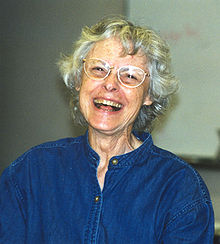Carol Emshwiller died on February 2. She was an important voice in the field, author of seven collections (plus two collections of her complete short fiction oeuvre) and six novels (two of which were Westerns).
Her wild yet disciplined creativity produced fiction that ranged from quirky and playful to downright experimental, and made her a delightful partner in conversation. She was best known in our field through her short fiction, which appeared in Harlan Ellison's Dangerous Visions and, frequently, in The Magazine of Fantasy and Science Fiction, but she produced some brilliant novels, too. I suspect it was the very versatility of her talent that made her novels nearly invisible to most readers. Her most powerful novel, in my opinion, was The Mount (2002), which won the Philip K. Dick Award, her most touching novel Ledoyt (1995), and her most playful and wrenching novel Carmen Dog (1988).
I first met Carol in person in 2001, shortly after an essay of mine, engaging with two of her early stories, "Sex and/or Mr. Morrison" and "Peninsula," appeared in Lady Churchill's Rosebud Wristlet. As we walked side by side down State Street in Madison, heading for lunch with a gaggle of other writers, she said, "I read your essay, you know." I don't exactly recall how my shock expressed itself--with a gasp, or an acceleration of my pulse? "It was interesting," she said. And then she really surprised me by confiding that "Peninsula" is about incest-- which I'd suspected but had been too unsure of to bring into the essay, since if my speculation were wrong, it would likely skew my discussion of it unforgivably.
After that first meeting, we met at each subsequent WisCon she attended, usually at dinner with Tom, whom she liked a great deal; and she often sat with Andrea Hairston and me at the Sign-out held at the end of WisCon, where fans bring books to be signed by attending authors. In one of our earliest meals together, Carol expressed an earnest need to let me know that she wasn't a feminist--because, she said, she liked men. I never did figure out how she reconciled that strange equation of feminism with man-hating to her identification of me as a feminist (even before we met) and our always happy talk-heavy meals with Tom. There was never been any doubt in my own mind, though, that Carol was a feminist through and through.
When in 2005 I asked her to send me an epistolary fantasy, she wrote a "Love Letter to My Character Abiel/Beal Ledoyt," which I published in Talking Back (2006). It begins "I've never loved a character of mine as much as I love you. I know you don't want to hear anything like this or even a little bit like this. It'll embarrass you."
The relationship between an author and her characters is, at base, thoroughly personal, no matter its residence in the author's imagination. "I first saw you," Carol writes of Ledoyt, "and began to think of you as a character at a little, homey rodeo in a small town. No real bleachers, just a few rows of seats--as if for a home-town baseball game. You were a few rows ahead of me with a red-headed three-year-old girl on your lap. But mostly you were surrounded by boys--a whole van load, five or six eight-to-twelve year olds it looked like. They vied for your attention., but you were quiet. I think joking under your breath. The kids laughed, but I couldn't hear. You were a countrified looking man. Thin and bony. The kind of man who could never look dressed up no matter what you had on."
At one point, she confesses, "I almost didn't finish the book when I realized you'd have to die."
Her letter ends with "Though you're of my own making, I'm...Yours always, Carol."
I write to her, now: Carol, your strong, vibrant voice will always be with us.

No comments:
Post a Comment